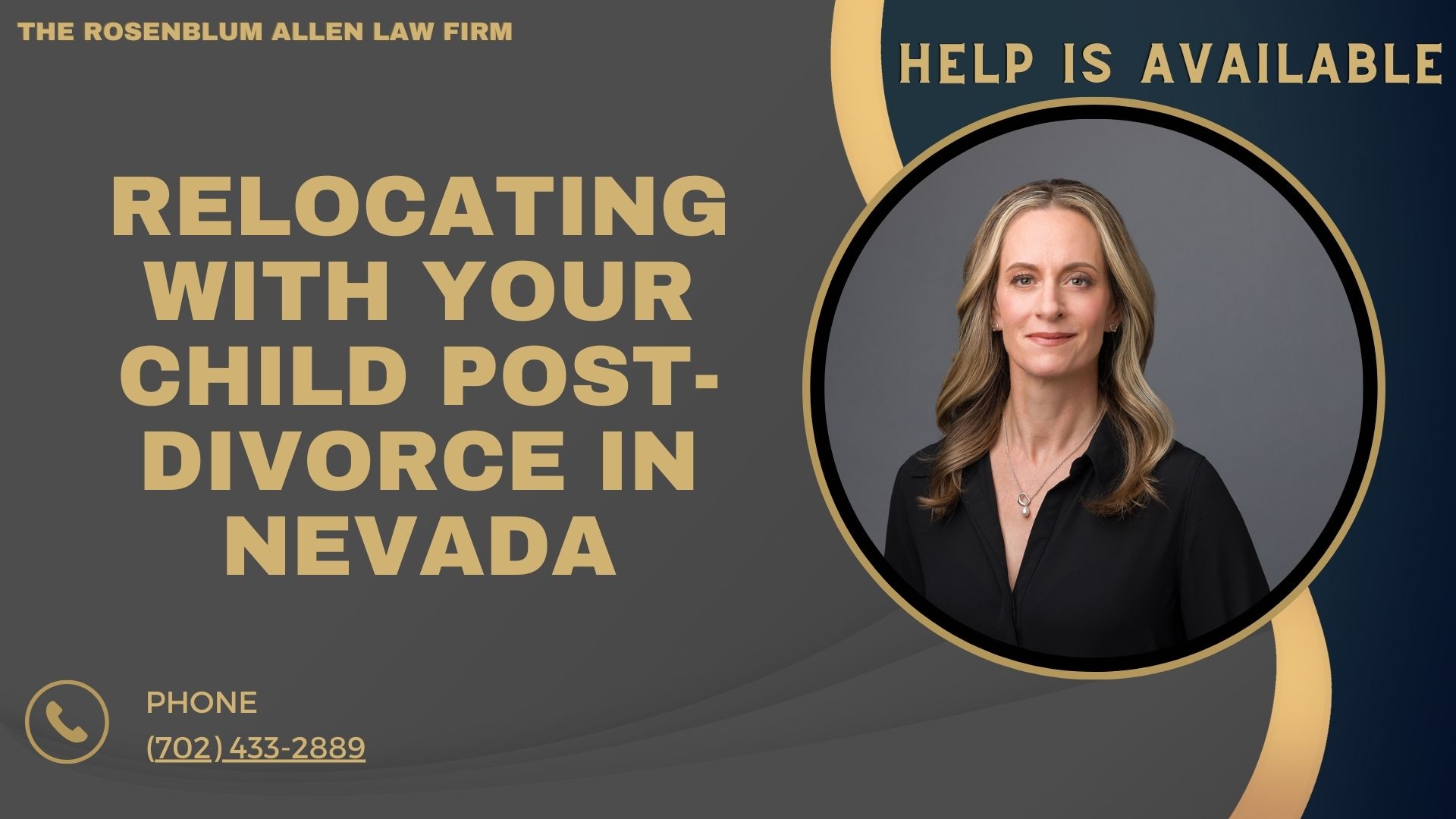Are you a divorced parent in Nevada considering a move with your child? You’re not alone. Many parents face this challenging situation. This guide will walk you through the process step by step.
Understanding Nevada Relocation Laws
Nevada takes child relocation seriously. Before you pack your bags, it’s crucial to understand the legal landscape.
NRS 125C.007 Overview
Nevada Revised Statute 125C.007 is your go-to law for child relocation. It’s designed to protect the child’s best interests while respecting parents’ rights.
This statute applies when:
- You want to move with your child to a place outside of Nevada
- Your move would substantially impair the other parent’s ability to maintain a meaningful relationship with the child
Remember, if you follow the proper procedures, the law is on your side.
Definition of Relocation
In Nevada, “relocation” isn’t just any move. It specifically refers to:
- Moving to a place outside of Nevada
- They are moving to a place within Nevada that’s far enough to substantially impair the other parent’s ability to maintain their current custody or visitation schedule.
For example, moving from Las Vegas to Reno, which is within Nevada, might be considered relocation.
Legal Requirements for Moving with a Child
Before you start house-hunting in another state, here’s what you need to know:
- You must have primary physical custody of the child
- You need written consent from the other parent OR court permission
- You must prove that the move is in good faith and not to frustrate the other parent’s custody rights
- You must show that the move is in the best interests of the child
It might seem daunting but don’t worry. We’ll break down each step in the following sections.
Steps to Relocate with Your Child
Now that you understand the basics let’s dive into the actual process.
Obtain Written Permission from the Other Parent
The easiest path is getting the other parent to agree. Here’s how to approach it:
- Have an open, honest conversation about your reasons for moving
- Listen to their concerns and try to address them
- Discuss how you’ll maintain their relationship with the child
- If they agree, get it in writing and have it notarized
Remember, even if you get their permission, it’s wise to have the agreement formalized by the court.

File a Petition for Relocation
If the other parent disagrees (which is common), you’ll need to file a petition with the court.
Required Documentation
Your petition should include:
- Your proposed relocation plan
- The reasons for your move
- A revised custody and visitation schedule
- Your plan for maintaining the child’s relationship with the other parent
Be thorough and honest. The court appreciates transparency.
Demonstrating Good Faith Reasons
The court wants to see that you’re moving for legitimate reasons, not to interfere with the other parent’s rights. Good faith reasons might include:
- A job offer with better pay or opportunities
- Moving closer to family support
- Educational opportunities for you or the child
- A serious health condition requiring specialized treatment
Whatever your reason, be prepared to provide evidence.
Attend Court Hearing
This is your chance to make your case. Treat it seriously.
Presenting Your Case
Here’s how to make a strong impression:
- Dress professionally
- Speak clearly and respectfully
- Stick to the facts
- Be prepared to answer questions about your relocation plan
Remember, the judge is trying to determine what’s best for your child. Show that you’ve thought everything through.
Addressing Court Considerations
The court will consider several factors. Be ready to address:
- How the move will affect your child’s quality of life
- Your child’s relationship with both parents
- Your child’s ties to their current community
- Your reasons for moving
- The other parent’s reasons for opposing the move
You’ll be better prepared to make your case by anticipating these questions.
Moving with your child after divorce is a complex process, but with the proper preparation and understanding, it’s achievable. Remember, the court’s primary concern is your child’s well-being. Keep that at the forefront of your planning, and you’ll be on the right track.

Factors the Court Considers
When you’re standing in that courtroom, it might feel like your whole future is in the judge’s hands. And in a way, it is. But don’t worry – judges don’t make these decisions lightly. They look at several key factors to ensure they do what’s best for your child.
Best Interests of the Child
This is the golden rule in family court. Everything revolves around it. The judge will be asking:
- Will this move improve your child’s life?
- How will it affect their education?
- What about their emotional well-being?
- Will they have access to better healthcare?
Remember, it’s not just about what you want. It’s about what’s best for your little one.
Quality of Life Improvement
The court wants to see that this move will make your child’s life better. Think about:
- Better schools
- Safer neighborhoods
- More opportunities for extracurricular activities
- Improved living conditions
You’re on the right track if you can show that your child’s life will improve significantly.
Motives of Both Parents
Here’s where things can get a bit tricky. The judge will examine why you want to move, and your ex doesn’t want you to. They’re checking for:
- Are you trying to limit the other parent’s access to the child?
- Is your ex opposing the move just to make things difficult for you?
Be honest about your reasons. Courts appreciate transparency.
Visitation and Parental Relationships
Moving away doesn’t mean cutting ties. The court will want to know:
- How will you maintain your child’s relationship with the other parent?
- What’s your plan for visitation?
- Have you considered virtual visitation options?
Show that you’ve thought this through. A detailed plan can go a long way.

Child’s Ties to Nevada
Your child’s roots in Nevada matter. The court will consider:
- How long have they lived in Nevada?
- Do they have close relationships with extended family here?
- Are they involved in community activities?
- How will the move affect these ties?
Be prepared to address how you’ll help your child maintain essential relationships.
The burden of Proof for Relocating Parent
When you want to move, the ball’s in your court. You need to prove your case.
Demonstrating Actual Advantage
It’s not enough to say the move will be good. You need to show it. Consider:
- Job offer letters with salary details
- Information about better schools
- Details about improved living conditions
Concrete evidence is your best friend here.
Proving Good Faith Reason
The court must know you’re not moving just to spite your ex. Good faith reasons might include:
- Career Advancement
- Educational opportunities
- Family support
- Health reasons
Be honest and upfront about your motivations.
Showing Compliance with Visitation Orders
Have you been following the current visitation schedule? If so, great! If not, you might face some challenges. The court will want to see that you:
- Respect the other parent’s rights
- Encourage a relationship between your child and their other parent
- Are likely to continue following court orders after the move
Your past behavior can be a good indicator of future actions.

Potential Outcomes
After all the paperwork, hearings, and nail-biting, you’ll finally get a decision. Let’s look at what might happen.
Approved Relocation
Congratulations! The court has given you the green light. But there’s still work to do.
Adjustments to Custody and Visitation
Your current arrangement will likely need some tweaks. This might include:
- Extended visits during school breaks
- More frequent phone or video calls
- A new schedule for holidays
Be flexible and willing to compromise. It’ll make the transition smoother for everyone.
Modifications to Child Support
Moving might change your financial situation. Child support could be adjusted to account for:
- Changes in income
- Travel expenses for visitation
- Cost of living differences
Be prepared for these discussions. They’re an essential part of the process.
Denied Relocation
If the court says no, it’s not the world’s end. You have options.
Next Steps and Alternatives
- Appeal the decision if you believe there was a legal error
- Consider a compromise, like moving to a closer location
- Look for ways to achieve your goals without moving
Remember, this isn’t a permanent decision. Circumstances change, and you can always petition again in the future if needed.
Moving with your child after divorce is a complex journey. But with patience, preparation, and a focus on your child’s well-being, you can navigate it successfully. Remember, you’re not alone in this process. Resources and professionals are ready to help you every step of the way.
Legal Assistance and Resources
Navigating the legal maze of child relocation can feel overwhelming. But don’t worry, you don’t have to do it alone. Let’s explore how to get the help you need.
Importance of Legal Representation
Think of a family law attorney as your personal guide through this journey. They can:
- Explain complex legal terms in plain English
- Help you gather the proper evidence
- Prepare you for court appearances
- Negotiate with your ex’s attorney
Remember, this is a big decision that affects your child’s future. Having a pro in your corner can make all the difference.

Finding a Qualified Family Law Attorney
Not all lawyers are created equal. Here’s how to find the right one for you:
- Ask for recommendations from friends or family
- Check with the State Bar of Nevada for licensed attorneys
- Look for lawyers who specialize in family law and relocation cases
- Schedule consultations with a few attorneys before deciding
Pro tip: Don’t be afraid to ask about their experience with relocation cases. The more, the better!
Consequences of Unauthorized Relocation
Are you thinking about just packing up and leaving? Hold that thought. Unauthorized relocation can land you in hot water.
Legal Ramifications
The court takes this seriously. If you move without permission, you could face:
- Contempt of court charges
- Fines
- Jail time in extreme cases
It’s not worth the risk. Always follow the legal process, even if it seems slow.
Impact on Custody Rights
Moving without approval can backfire big time. You might end up:
- Losing primary custody
- Having reduced visitation rights
- Damaging your credibility with the court
The judge might see unauthorized relocation as a sign that you don’t respect court orders or co-parenting responsibilities.
Preparing for the Move
So, you’ve got the green light to move. Exciting times! But before packing boxes, let’s ensure you’re fully prepared.
Creating a Detailed Relocation Plan
Think of this as your roadmap for the move. It should include:
- Timeline for the move
- New living arrangements
- Job details (if applicable)
- Budget for moving expenses
The more detailed your plan, the smoother your transition will be.
Addressing Educational and Healthcare Needs
Your child’s well-being is a top priority. Make sure you’ve got these bases covered:
Education:
- Research schools in your new area
- Arrange for transfer of school records
- Plan for any needed tutoring or support during the transition
Healthcare:
- Find new doctors and dentists
- Transfer medical records
- Ensure any ongoing treatments can be continued
Pro tip: Start this process early. It can take time to get everything in order.
Maintaining Communication with the Non-Relocating Parent
Moving doesn’t mean cutting ties. Good communication is more critical than ever. Consider:
- Setting up a regular schedule for calls or video chats
- Using a co-parenting app to keep track of schedules and share updates
- Being flexible with visitation, especially during the transition period
Remember, your child’s relationship with both parents is crucial for their well-being.
Moving with your child after divorce is a big step. It requires careful planning, open communication, and focusing on your child’s best interests. However, the proper preparation and attitude can bring about positive change for everyone involved.

Conclusion
Remember, you’re not just moving houses—you’re opening a new chapter in your family’s story. Approach it with patience, empathy, and optimism. Your child will take cues from you, so stay positive and focused on the exciting opportunities ahead.
And most importantly, don’t forget to take care of yourself during this process.
Moving is stressful, but you’ve got this. One step at a time, you’ll get there. Here’s to new beginnings and brighter tomorrows for you and your child!

Frequently Asked Questions
How long does the relocation process typically take?
The timeline can vary significantly depending on your specific circumstances. If both parents agree, getting court approval can be relatively quick – potentially just a few weeks. However, if there’s disagreement and you must go through a court hearing, it could take several months. Be prepared for the process to take anywhere from 2 to 6 months or possibly longer in complex cases.
Can I move within Nevada without court permission?
It depends on the distance and impact on the current custody arrangement. If the move within Nevada substantially impairs the other parent’s ability to maintain their current custody or visitation schedule, you’ll likely need court approval. Always consult with a family law attorney before making any significant moves.
What if my child wants to move with me?
While the court will consider your child’s wishes, especially if they’re older, it’s not the only factor. The judge will still evaluate all aspects of the best interests of the child’s standard. Your child’s preference is necessary but not decisive.
Can I appeal if my relocation request is denied?
Yes, you can appeal a denied relocation request. However, appeals are complex and typically based on legal errors rather than a reevaluation of facts. Consult an attorney experienced in appellate law to understand your options and chances of success.
How does relocation affect child support payments?
Relocation can impact child support in various ways. The court may adjust payments to account for changes in income, cost of living differences, or additional expenses like travel costs for visitation. Be prepared to revisit your child support agreement during the relocation process.
What if I need to move urgently for a job or family emergency?
In urgent situations, you can file for an expedited hearing. However, even in emergencies, moving without court approval can have serious consequences. If possible, seek temporary orders from the court before making any moves.
Can my ex prevent me from moving if they have visitation rights but not custody?
Even if your ex only has visitation rights, they can still object to your move. The court will consider how the move impacts their ability to maintain a relationship with the child. You’ll need to demonstrate that the move is in the child’s best interests and propose a plan to keep the non-custodial parent’s relationship with the child.
How detailed does my relocation plan need to be?
Your relocation plan should be as detailed as possible. Include information about housing, schools, healthcare, employment, and a proposed visitation schedule. The more comprehensive your plan, the better you demonstrate to the court that you’ve thoroughly considered your child’s needs.
What if I want to move internationally with my child?
International relocation cases are typically more complex. You’ll need to address additional factors such as global custody laws, potential cultural and language barriers, and how to facilitate the other parent’s visitation across international borders. These cases often require specialized legal expertise.
Can I relocate temporarily, such as for a summer job or extended family visit?
Temporary relocations impacting the other parent’s visitation schedule may still require court approval. Always communicate with the other parent and consider seeking a temporary modification of your custody order for extended stays away from Nevada.

Glossary
Best Interests of the Child: The legal standard used by courts to make decisions affecting a child’s welfare, considering factors such as the child’s safety, stability, and relationships with both parents.
Child Custody: The legal right and responsibility to care for and make decisions for a child, which can be joint (shared by both parents) or sole (given primarily to one parent).
Contempt of Court: Disobeying a court order can result in legal penalties, including fines or jail time.
Custodial Parent: The parent who has primary physical custody of the child and with whom the child primarily resides.
Expedited Hearing: Due to urgent circumstances, a court proceeding was scheduled and heard more quickly than usual.
Good Faith: Acting with honest intent and without the purpose of defrauding or seeking unfair advantage over another party.
Joint Custody: An arrangement where both parents share legal and/or physical custody of the child.
Legal Custody: The right to make important decisions about a child’s upbringing, including education, healthcare, and religious instruction.
Non-Custodial Parent: The parent who does not have primary physical custody of the child but typically has visitation rights.
NRS (Nevada Revised Statutes): The codified laws of the State of Nevada, including child custody and relocation.
Physical Custody: The right of a parent to have a child live with them.
Primary Physical Custody: When a child lives with one parent more than 60% of the time.
Petition for Relocation: A formal request submitted to the court asking permission to move with a child to a new location that would affect the current custody arrangement.
Relocation: In legal terms, moving to a location that would substantially impair the ability of the other parent to exercise their custodial rights.
Sole Custody: When one parent has exclusive legal and physical custody rights over a child.
Substantial Change in Circumstances: A significant alteration in either parent’s or child’s situation may justify modifying a custody order.
Visitation: The right of a non-custodial parent to spend time with their child according to a schedule determined by agreement or court order.
Visitation Rights: The legal right of a non-custodial parent to spend time with their child.
Virtual Visitation: The use of technology (such as video calls) to maintain contact between a child and a parent who lives far away.
Written Consent: A document signed by both parents agreeing to the relocation of the child, which may still require court approval to be legally binding.

Additional Resources for You
For those navigating the complexities of divorce, it’s important to have access to reliable and comprehensive resources. Our lead attorney, Molly Rosenblum Allen, Esq., has not only represented numerous clients with exceptional skill and dedication but has also created a suite of informative resources to support you during this challenging time. Here’s an overview of the valuable guides and articles available to you:
Las Vegas Divorce Attorney: A detailed guide to understanding the intricacies of divorce proceedings in Las Vegas, offering insights and advice for those seeking legal support in the region.
Nevada Divorce: An extensive resource focusing on divorce laws and processes specific to the state of Nevada, tailored to help residents navigate their cases with greater clarity.
Surviving Divorce: A supportive guide offering strategies and tips to manage the emotional and practical challenges of going through a divorce.
What Happens If You Don’t Sign Divorce Papers: An informative article addressing the implications and legal considerations if one party refuses to sign divorce papers.
Do I Need an Attorney to Get a Divorce: A crucial read for those contemplating whether legal representation is necessary for their divorce proceedings.
What is a Collaborative Divorce: An in-depth look at the collaborative divorce process, highlighting its benefits and how it differs from traditional divorce proceedings.
How to Win a Divorce: Strategic insights and advice for those looking to navigate their divorce proceedings with a focus on favorable outcomes.
Switching Lawyers During Divorce: Guidance on how and when it might be necessary to change legal representation during a divorce.
How Long Does a Divorce Take in Nevada: An article providing a timeline and factors that affect the duration of divorce proceedings in Nevada.
High Conflict Divorce: Insights into navigating a divorce characterized by high levels of disagreement and tension between parties.
Questions to Ask a Divorce Lawyer: A comprehensive list of important questions to consider when consulting with a divorce lawyer, ensuring you’re fully prepared and informed.
Molly Rosenblum Allen, Esq., is committed to providing accessible and authoritative resources to assist you in your time of need, guiding you through the legal maze of divorce with expertise and compassion.

Offsite Resources You May Find Helpful
Here are some offsite resources that may be beneficial for those considering moving out of Nevada with their child after divorce:
-
Nevada Revised Statutes: NRS 125C.200 – Relocation of Child: This is the official text of the Nevada law that governs the relocation of a child after a custody determination. It provides detailed information on the legal requirements and process.
-
FindLaw – Nevada Child Custody Laws: FindLaw provides a comprehensive guide on Nevada’s child custody laws, which will help in understanding the legal implications of moving with a child after divorce.
-
JustAnswer – Ask a Lawyer: JustAnswer allows you to pose legal questions to licensed attorneys, including queries about moving out of Nevada with a child after divorce.
-
Avvo – Nevada Family Law Questions & Answers: Avvo provides a platform where you can ask questions and receive answers from attorneys, including those concerning child custody and relocation post-divorce in Nevada.

A Special Message from Our Lead Attorney

Molly Rosenblum, Esq
Have you found yourself needing to hire a Las Vegas Divorce Attorney?
Look no further than The Rosenblum Allen Law Firm!
We have years of experience handling divorce cases, ensuring the outcome is fair and balanced.
Our top-notch staff will work with you every step, giving their full attention and expertise to solve your case efficiently.
Let us take care of it so you can focus on other things during this challenging process.
Here at The Rosenblum Allen Law Firm, we truly understand what our clients are going through and want nothing more than for them to resolve any legal issues related to divorces successfully.
So call us now at (702) 433-2889 for an initial consultation – let’s get started on putting your life back together again!
The Reason You Haven't Hired A Child Custody Attorney Yet
We’re ready to fight for the rights of your family if you hire us. We’re waiting to jump into action on the behalf of your family.




